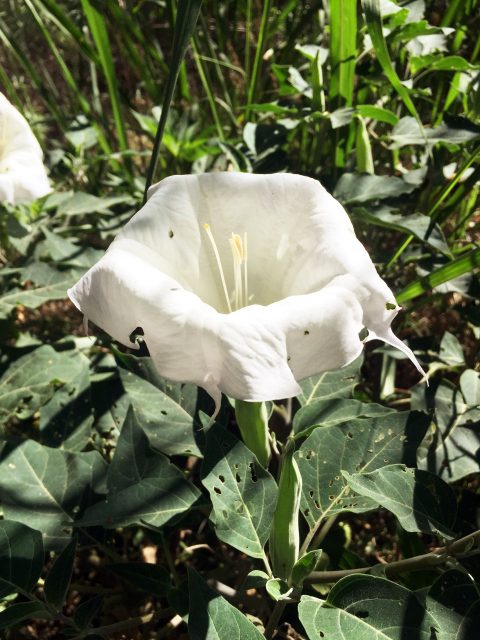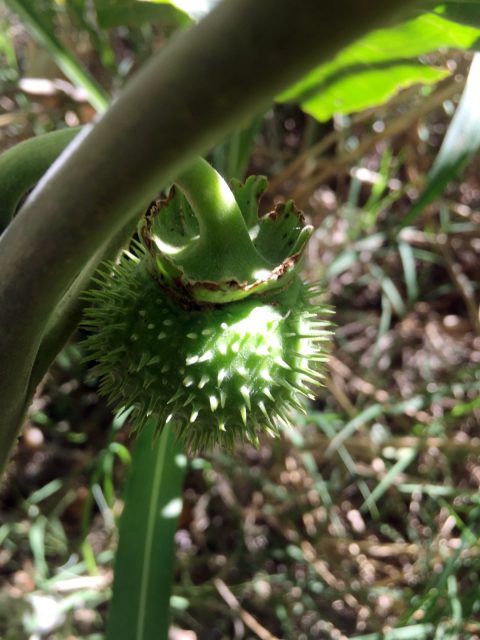- Home
- >
- Preservation Archaeology Blog
- >
- Sacred Datura
(June 21, 2017)—Datura. The Devil’s Weed. Yerba del Diablo. Jimsonweed. Nightshade.
All of these names refer to a genus of potent medicinal and hallucenogenic plant. When consumed, it can even be fatal or cause paralysis. As this is my first time in New Mexico or the Southwest in general, I was unaware that a plant in this area of the world could have such strong and dangerous effects. Still, the beauty of the white trumpet flowers and the connection to traditional cultural beliefs fascinated me, and drew me to investigate the stunning flower.
Datura wrightii, otherwise known as Sacred Datura, is a species of plant within the Nightshade family. As such, Datura’s striking white flowers bloom at night and close before noon the next day. The plant is common to the American Southwest, Caribbean, and West Indies, and has woven itself into the history of the landscape and the people who have inhabited it.

In the past, indigenous people of the American Southwest and surrounding areas used Datura in rituals, most notably coming-of-age rituals. With expert knowledge concerning their natural resources, traditional healers prepared Datura to enhance certain effects and neutralize other effects of for use in religious and social life. For example, traditional Chumash rites of passage instruct that a boy of eight years old be given a drink, called momoy, to enhance the boy’s spiritual wellbeing required for the role of manhood. The plant was also central to the Zuni people’s relationship with rain. Powdered Datura root is used by rain priests to ensure fruitful rains, an especially necessary action in the arid Southwest. Further south among tribes in Northern Mexico and parts of Texas, Datura was used by shamans to transcend the borders of life and death and communicate with spirits. Among the Mohave, Yuma, Cahuilla, Zuni, and other cultural groups, Datura is used more generally to create and break hexes, to protect from evil, and even as a sleep and dream aid. The sacred plant is thus a deeply significant part of the Southwest’s cultural history.

Clearly, with such a strong connection to the religious and spiritual beliefs of the original inhabitants of the country, Datura is an amazing natural and cultural resource. Indeed, beyond the rituals described above, vessels of the Salado people feature Datura’s spiky seed-pod shape.
The vivid significance of a single plant is fascinating, and my contact with Datura—however cautious—gives me access to a living museum of sorts. It has undeniably deepened my understanding of indigenous peoples’ past and present relationship to the natural world. More than that, it has deepened my appreciation of New Mexico’s sacred past. In the end, learning about the Sacred Datura has added to my love of the Southwest!
2 thoughts on “Sacred Datura”
Comments are closed.
Explore the News
-
Join Today
Keep up with the latest discoveries in southwestern archaeology. Join today, and receive Archaeology Southwest Magazine, among other member benefits.
I have grown this plant in my ornamental garden many times and never had an ill effect from handling or brushing up against it.
I believe that you must ingest it to get an hallucinogenic effect, which I have never done. And do not recommend
In fact, all parts of this plant are highly poisonous, and deaths do occur regularly. Ingestion, smoking, or inhalation are all hazardous (inhalation may be accidental by inhaling small plant particles while “weed-whacking” in an area where datura grows — I wouldn’t want to inhale smoke from the burning plant either). The level of exposure that causes an effect in very close to the toxic level that can produce extreme nausea and vomiting, and even death.
— Dan Judkins